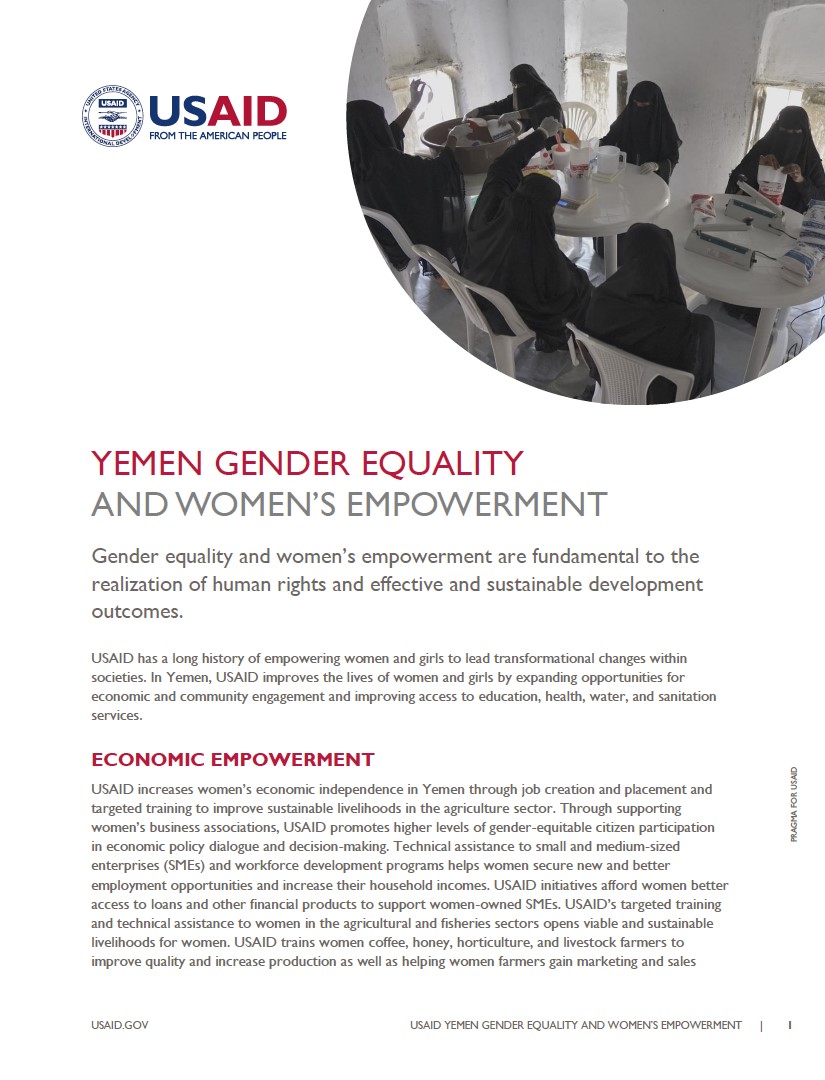Speeches Shim
Gender equality and women’s empowerment are fundamental to the realization of human rights and effective and sustainable development outcomes.
USAID has a long history of empowering women and girls to lead transformational changes within societies. In Yemen, USAID improves the lives of women and girls by expanding opportunities for economic and community engagement and improving access to education, health, water, and sanitation services.
ECONOMIC EMPOWERMENT
USAID increases women’s economic independence in Yemen through job creation and placement and targeted training to improve sustainable livelihoods in the agriculture sector. Through supporting women’s business associations, USAID promotes higher levels of gender-equitable citizen participation in economic policy dialogue and decision-making. Technical assistance to small and medium-sized enterprises (SMEs) and workforce development programs helps women secure new and better employment opportunities and increase their household incomes. USAID initiatives afford women better access to loans and other financial products to support women-owned SMEs. USAID’s targeted training and technical assistance to women in the agricultural and fisheries sectors opens viable and sustainable livelihoods for women. USAID trains women coffee, honey, horticulture, and livestock farmers to improve quality and increase production as well as helping women farmers gain marketing and sales techniques while connecting them with key buyers. In the fisheries sector, USAID helps coastal women develop related skills such as fish canning and sea salt production to increase household incomes.
USAID Yemen Gender Equality and Women's Fact Sheet ![]() (pdf - 193k)
(pdf - 193k)
COMMUNITY ENGAGEMENT
USAID prioritizes inclusion of women in community engagement processes to ensure their voices are heard and contribute to resolving local grievances and strengthening social cohesion. To ensure women’s viewpoints, concerns, and priorities are considered, USAID partners: facilitate women-inclusive discussions with government, tribal, and religious leaders; incorporate the expertise of gender advisers, female community organizers, and female project staff in leadership roles; and organize women-specific community outreach events. A USAID-funded project developed a Gender Equality and Social Inclusion Action Plan that details the required steps for inclusion of marginalized groups, including women, in all activities.
ACCESS TO SERVICES
EDUCATION
USAID’s education programs directly address gender disparities in education, such as higher dropout rates among girls. USAID improves access to quality education by engaging families and communities to support safe learning spaces that prioritize the needs of women and girls; training parents and community members on child protection with a special focus on girls and gender inclusivity in both formal and non-formal education settings; and providing remedial/alternative learning programs, which have shown to increase enrollment and retention for girls.
Health
USAID betters maternal and child health outcomes by: improving reproductive, maternal, infant, and child health service delivery; engaging with communities to build trust in the health system; and addressing underlying systemic issues that impede health service delivery and decision-making. To increase access to and use of health facilities by women, USAID strengthens the female health care workforce by training female health providers, community health workers, and midwives. USAID supports stronger linkages and referrals between health centers, enabling beneficiaries—especially women and girls—to access important services unavailable in their communities.
Water, Sanitation, and Hygiene (WASH)
USAID rehabilitates WASH infrastructure in communities to help provide access to safe water and sanitation facilities for women and girls, which in turn improves their access to education, health services, and economic opportunities. Women are traditionally responsible for collecting water for the family’s use – a responsibility that interferes with school and work and affects their health and personal safety, adding to biases against women’s integration into public life. Upgrades to water and sanitary facilities and household latrines allow adolescent girls to remain in school and avoid unsafe areas, unsanitary water, and increased exposure to gender-based violence. Hygiene awareness sessions specifically targeted toward women accelerate positive behavior change at the individual, family, community, and institutional levels.


Comment
Make a general inquiry or suggest an improvement.